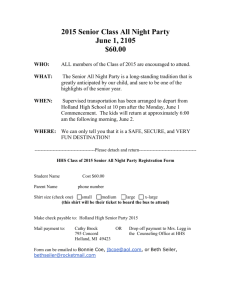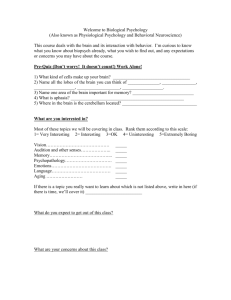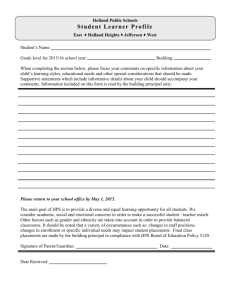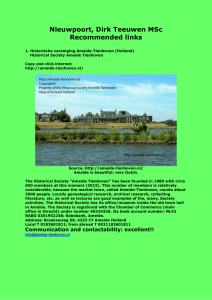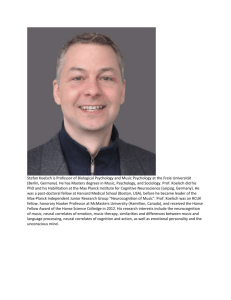Department of Psychology - Johns Hopkins University
advertisement
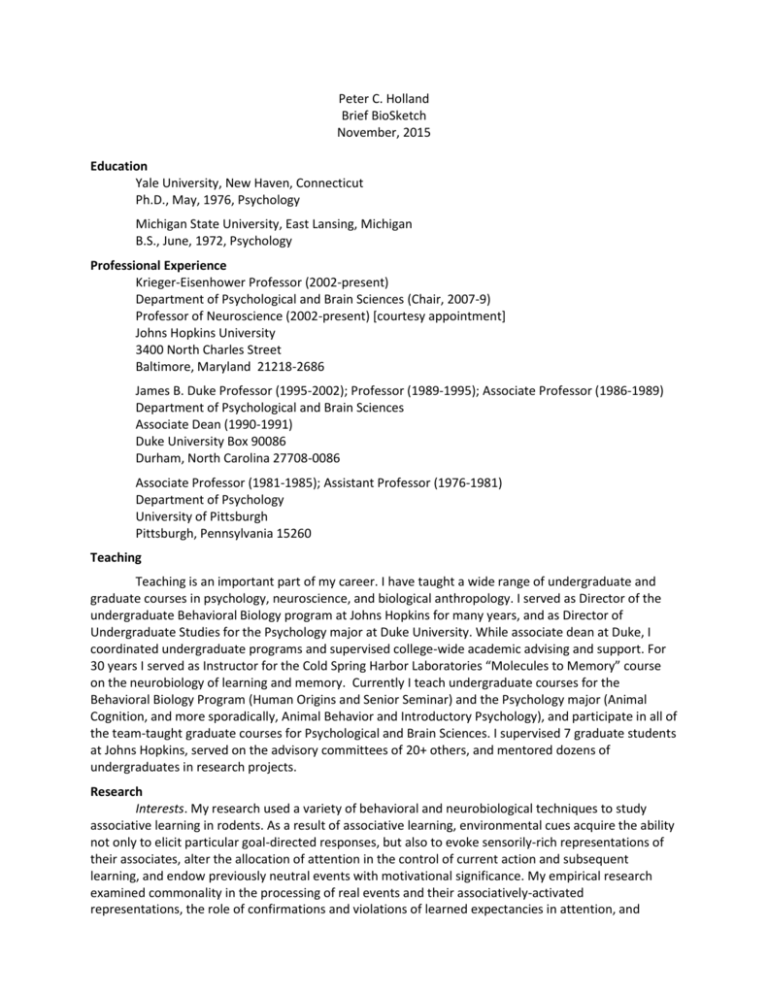
Peter C. Holland Brief BioSketch November, 2015 Education Yale University, New Haven, Connecticut Ph.D., May, 1976, Psychology Michigan State University, East Lansing, Michigan B.S., June, 1972, Psychology Professional Experience Krieger-Eisenhower Professor (2002-present) Department of Psychological and Brain Sciences (Chair, 2007-9) Professor of Neuroscience (2002-present) [courtesy appointment] Johns Hopkins University 3400 North Charles Street Baltimore, Maryland 21218-2686 James B. Duke Professor (1995-2002); Professor (1989-1995); Associate Professor (1986-1989) Department of Psychological and Brain Sciences Associate Dean (1990-1991) Duke University Box 90086 Durham, North Carolina 27708-0086 Associate Professor (1981-1985); Assistant Professor (1976-1981) Department of Psychology University of Pittsburgh Pittsburgh, Pennsylvania 15260 Teaching Teaching is an important part of my career. I have taught a wide range of undergraduate and graduate courses in psychology, neuroscience, and biological anthropology. I served as Director of the undergraduate Behavioral Biology program at Johns Hopkins for many years, and as Director of Undergraduate Studies for the Psychology major at Duke University. While associate dean at Duke, I coordinated undergraduate programs and supervised college-wide academic advising and support. For 30 years I served as Instructor for the Cold Spring Harbor Laboratories “Molecules to Memory” course on the neurobiology of learning and memory. Currently I teach undergraduate courses for the Behavioral Biology Program (Human Origins and Senior Seminar) and the Psychology major (Animal Cognition, and more sporadically, Animal Behavior and Introductory Psychology), and participate in all of the team-taught graduate courses for Psychological and Brain Sciences. I supervised 7 graduate students at Johns Hopkins, served on the advisory committees of 20+ others, and mentored dozens of undergraduates in research projects. Research Interests. My research used a variety of behavioral and neurobiological techniques to study associative learning in rodents. As a result of associative learning, environmental cues acquire the ability not only to elicit particular goal-directed responses, but also to evoke sensorily-rich representations of their associates, alter the allocation of attention in the control of current action and subsequent learning, and endow previously neutral events with motivational significance. My empirical research examined commonality in the processing of real events and their associatively-activated representations, the role of confirmations and violations of learned expectancies in attention, and mechanisms by which cues related to the presentation and removal of food acquire the ability to override normal satiety systems and control binge eating in the absence of energetic needs for consumption. I am especially interested in the roles of amygdala and hypothalamus in modulating functions of cortical and striatal systems, and computational approaches to understanding functional connectivity. Service. Over the course of my career I have served as charter (regular) member of two NIH review committees and one NSF review committee, as ad hoc member of many other NIH committees and special emphasis committees, as well as other agency project committees, such as RDoC. I have reviewed for many private research foundations and government agencies worldwide. I serve on the editorial boards of several journals, and review for many others. Grant support. My research was supported by NIH and/or NSF continuously since 1977. I have no current grant support or pending applications. Publications. I have over 200 peer-reviewed publications. Ten selected citations follow: Asem, J.S.A., Schiffino, F.L., & Holland, P.C. (2015). Dorsolateral striatum is critical for the expression of surprise-induced enhancements in cue associability. European Journal of Neuroscience, 42, 2203-2213. Esber, G.R., Torres-Tristani, K., & Holland, P.C. (2015). Amygdalo-striatal interaction in the enhancement of stimulus salience in associative learning. Behavioral Neuroscience, 129, 87-95. Schiffino, F.L., Zhou, V., & Holland, P.C. (2014). Posterior parietal cortex is critical for the encoding, consolidation, and retrieval of a memory that guides attention for learning. European Journal of Neuroscience, 39, 640-649. Wheeler, D.S., Wan, S., Miller, A., Angeli, N., Adileh, B., Hu, W., & Holland, P.C. (2014). Role of lateral hypothalamus in two aspects of attention in associative learning. European Journal of Neuroscience, 40, 2359-2377. Holland, P. C. (2014). Stimuli associated with the cancellation of food and its cues enhance eating but display negative incentive value. Learning & Behavior, 42, 365-382. Holland, P.C., Asem, J.S.A., Galvin, C.P., Hepps Keeny, C., Hsu, M., Miller, A., & Zhou, V. (2014). Blocking in autoshaped lever-pressing with rats. Learning & Behavior, 42, 1-21. Esber, G.R., Roesch, M.R., Bali, S., Trageser, J., Bissonette, G.B., Puche. A.C., Holland, P.C., & Schoenbaum, G. (2012). Attention-related Pearce-Kay-Hall signals in basolateral amygdala require the midbrain dopaminergic system. Biological Psychiatry, 72, 1012-1019. Purgert, R.J., Wheeler, D.S., McDannald, M.A., & Holland, P.C. (2012). Role of amygdala central nucleus in aversive learning produced by shock or by unexpected omission of food. Journal of Neuroscience, 32, 2461-2472. Calu, D.J., Roesch, M.R., Haney, R.Z., Holland, P.C., & Schoenbaum, G. (2010). Neural correlates of variations in event processing during learning in central nucleus of amygdala. Neuron, 68, 9911001. Jhou, T.C., Fields, H.L., Baxter, M.G., Saper, C.B., & Holland, P.C. (2009). The rostromedial tegmental nucleus (RMTg), a GABAergic afferent to midbrain dopamine neurons, selectively encodes aversive stimuli and inhibits motor responses. Neuron, 61, 788-800.
